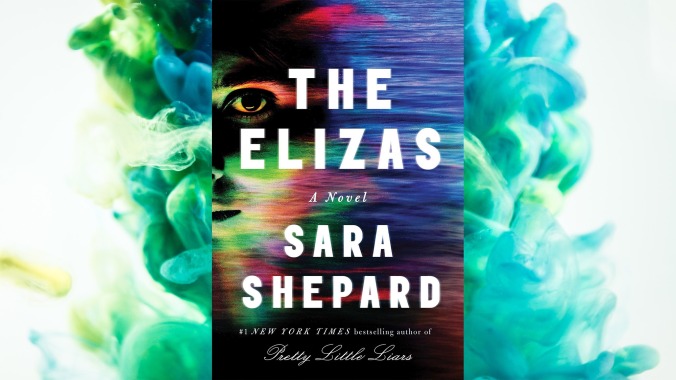The Elizas is a belly flop of a thriller from the author of Pretty Little Liars
Aux Features Book Review
The publication of Gone Girl sparked something of an arms race within literary thrillers, a long-dominant genre that nevertheless received a renewed burst of attention and popularity with Gillian Flynn’s massive bestseller. Authors took her ball and ran with it, each trying to outdo their peers by having the twistiest of narratives and the least-reliable of narrators.
The problem with this is that thrillers, like bombs, are built out of volatile ingredients, and an unsteady hand means they blows up in the face of the maker. The best thriller plots drive inward, effective for what they reveal about the characters, as opposed to outward and the writer’s willingness to unveil a triple-cross betrayal or whatever is intended to shock. Turns out there’s a whisper-thin line between topping another author and just plain toppling over, and Sara Shepard’s The Elizas stumbles so dramatically that from page two on it’s closer to gut busting than hair raising. In the event it follows The Girl On The Train or Big Little Lies to Hollywood, the David to give it the treatment it deserves isn’t Gone Girl’s Fincher but Airplane!’s Zucker.
This one’s unstable narrator is Eliza Fontaine, introduced raiding a hotel minibar, blacking out, and then waking up in a hospital, having nearly drowned in a swimming pool. Was she suicidal? Drunk and clumsy? Pushed in? Pushed in with intent to kill? She thinks she remembers someone fleeing the scene, but no one believes her. She’s a doubly unreliable narrator, see: not just an alcoholic, but also amnesiac from a recent brain operation. (A psychiatrist gets a timeless bit of dialogue: “That must have been tough to have a train tumor last year, huh?”)
The question of what happened that night and what led up to it is the driving question behind The Elizas, with Fontaine attempting to rebuild her fractured memory and determine whether she was, or remains, in danger, or even whether she herself did something criminal she can’t recall. In order to accommodate Shepard’s big narrative hooks—the brain-tumor subplot especially seems destined for bad-book cult immortality—the story is forced to go ludicrous, with outlandish coincidences, characters being told obvious lies that they believe just ’cause, and other narrative pieces that have to be pounded together, like Homer Simpson doing a jigsaw puzzle, in order for things to progress. The plotting is the literary equivalent of a comb-over for plot holes: just as thin, and just as effective as hiding what it’s supposed to cover.
A certain amount of forgiveness can be granted to the twists—even great thrillers aren’t completely airtight—but the fumbling in the writing goes beyond the genre requirements, sometimes seeming defiantly lazy or dumb. Half of The Elizas is dedicated to The Dots, an in-book book that our heroine doesn’t remember having written before her accident. That it tells the story of her life is clear from the get-go, but it’s never clear whether Fontaine takes the hour it would require to read it, and she does a couple of 180s over how she feels about having written it. (Her parents are adamant it not be published. Fontaine never presses them on why, because that’d end the book.)
Generally you want to grant a work of fiction its premise, but the depiction of publishing in The Elizas is so bizarre and unconvincing that it feels like a poorly disguised red herring. Surely this is ground that Shepard, whose Pretty Little Liars was a best-seller, can write from experience. Apparently not. First, the writing in The Dots is atrocious—hackneyed and shallow, which is convincing under the circumstances (Fontaine is shallow, after all, and this is her debut book), except for how everyone who reads it calls it a masterpiece. Early on a fan base grows around this unpublished debut novella written by an unknown, all because of the pool incident. Publicity-hungry writers, take note: just tumble drunk into a swimming pool, and soon you’ll have national buzz, which culminates here in a TV appearance where Fontaine is the first guest. Taylor Swift is the second.
There’s a sense that Shepard knows all the ingredients she should have for a compelling book, even if she can’t deliver them subtly. Attempts to make her protagonist more complex are torpedoed by her explicitly spelling out her complex character traits (“The thing is, I am awfully lonely. I crave sex, but I can get sex. It’s closeness that’s more elusive.”), and while she knows she should have a colorful cast of characters, she does this to such an insane degree that people come off as parody. The character of Desmond—who pulled Fontaine out of the pool and becomes her sidekick/love interest—gets this particularly badly. He’s laden with supposedly quirky character traits that are distractingly dumb, and he’s incapable of saying anything normally. Here are some of the lines of dialogue he has from just one page:
“I just wanted to see how you were doing, my fairest.”
“Would you like to partake in a beverage with me sometime?”
“You can’t even spare time for an aperitif?”
“If I’m being outré you can tell me to cease and desist.”
He also drives a Batmobile.